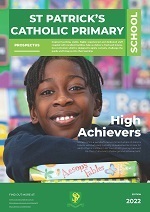Literacy, Communication and Language at St Patrick’s addresses fundamental aspects of human communication. It aims to support learning across the whole curriculum and to enable our pupils to gain knowledge and skills in English, Modern Foreign Language (Italian) as well as in literature.
The six parts of this area of the curriculum are addressed holistically. This means that different aspects such as listening, speaking, reading or writing are explored in relation to one another. It also means that learning about and through literature is seen as contributing to all aspects of learning about languages. The statements skills and knowledge support and complement one another and together they contribute to realising the purpose of our curriculum.
Learning and experience aim to enable pupils to communicate effectively using language. Our Literacy, Communication and Language curriculum aims to ignite pupils’ curiosity and enthusiasm and provide them with a firm foundation for a lifelong interest in learning making them ambitious, capable learners, ready to learn throughout their lives.
We believe that by nurturing a questioning and creative mind and a mind willing to investigate, contextualise and challenge, we enable our children to interpret the world around them and express their opinions confidently, both in writing and orally.
We encourage a love of reading, with an excellently stocked and accessible library and classrooms, a welcoming and book-loving librarian, reading challenges throughout the year, competitions, awards and author visits to inspire our children and staff.
Download The Intent of our Reading Curriculum

Children in Early Years, Year 1 and Year 2 develop an appetite for reading and writing from a very early stage; with discussing characterisation in picture books to the effectiveness of setting and mood through visuals. Supported with daily phonics, handwriting, reading, and story time, children’s interests are awakened as they begin to unlock the tools to become successful readers and writers.
In Years 3-6, this progresses to working closely with literature from different cultures and times. Children are encouraged to explore the many facets of writing, from paying attention to language to investigating the use of non-standard English through, to writing in formal and informal styles.


We use innovative teaching styles to enthuse and engage our children. In any one day, you may see drama techniques, musical prompts, detective investigations and hotly contested debates being used to embed the core skills, address current issues and stimulate the individual needs of our children.
We know that English sits at the heart of education and we set the highest of expectations for every child, to always strive for and reach their very best. The academic rigour permeates our curriculum allowing children to achieve excellence through engagement, investigation and enjoyment.
This readiness to learn is further supported since effective language skills help pupils to make sense of concepts across the curriculum, for example by enabling them to articulate their reasoning when solving problems and analysing information. Effective multilingual skills deepen this ability as they enable pupils to respond in many more contexts.
Given that a key aspect of effective language learning is the willingness to experiment and take risks in trying out new structures, sounds and patterns, learning and experience in this area of the curriculums aims to empower pupils to be creative and to persevere when facing challenges. Together, these skills can build our learners’ confidence to grasp new opportunities and to adapt to different roles which in turn can develop them as enterprising, creative contributors, ready to play a full part in life and work.
We see language as a key to social cohesion, which can promote better local, national and global understanding. We encourage pupils to engage critically with languages and literature in order to help them develop not only their own sense of identity, but also an understanding of the relationship between their own cultures and communities and those of other people. This understanding is deepened as pupils are afforded opportunities to learn Spanish during their primary years of education, continuing to improve their fluency in secondary schools. This linguistic knowledge and skills are needed to participate confidently and empathetically in society, which contributes to developing our pupils as ethical and informed citizens.
The skills we teach through this area of the curriculum also help our pupils to become healthy, confident individuals, ready to lead fulfilling lives as valued members of society. These skills, promoted through languages, literacy and communication are key to enabling our pupils to express themselves effectively, to be open to other people’s points of view and to develop positive relationships.

1 Longfield Avenue
Walthamstow
London
E17 7DP
Tel: 0208 509 4321
Email: school@st-patricks.waltham.sch.uk
